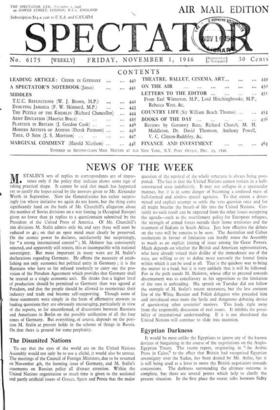The Disunited Nations
To say that the eyes of the world are on the United Nations Assembly would not only be to use a cliché, it would also be untrue. The meetings of the Council of Foreign Ministers, due to be resumed on November 4th, the looming issue of Germany, and M. Stalin's statements on Russian policy all distract attention. Within the United Nations organisation so much time is given to the sectional and partly artificial issues of Greece, Spain and Persia that the major question of the survival of the whole structure is always being post- poned. The fact is that the United Nations cannot remain in a half- constructed state indefinitely. It may not collapse in a spectacular manner, but it is in some danger of becoming a confused mass of half-formed and aimless special agencies. To that extent a deter- mined and explicit attempt to settle the veto question once and for all might breathe the breath of life into the United Nations. Cer- tainly no such result can be expected from the other issues occupying the agenda—such as the resettlement policy for European refugees, the strength of armed forces outside their home territories and the treatment of Indians in South Africa. Just how effective the debate on the veto will be remains to be seen. The Australian and Cuban resolutions in favour of limitation can hardly rouse the Assembly as much as an explicit joining of issue among the Great Powers. Much depends on whether the British and American representatives, who have already voiced their dislike of the immoderate use of the veto, are willing to try to define more narrowly the formal limits within which it can be used at all. That is the quickest way to bring the matter to a head, but it is very unlikely that it will be followed. For in the path stands M. Molotov, whose offer to proceed towards disarmament was as conciliatory as his opposition to the limitation of the veto is unbending. His speech on Tuesday did not follow the example of M. Stalin's recent utterances, but the less eminent line of the White Russian and Polish delegates who preceded him and introduced once more the futile and dangerous debating device of questioning other countries' motives. This leads right away from the responsible discussion of real issues. It inhibits the possi- bility of international understanding. If it is not abandoned the United Nations will continue to slide into inanition.


































